In Focus This Week
Launching Stanford-MIT Election Performance Central
Today, scholars at MIT and Stanford are launching a new project to shed light on the challenges facing election administration in the United States during the 2024 election: the Stanford-MIT Election Performance Central (EPC).
 The EPC will provide critical information and analysis assessing how the American election administration system responds and adapts in light of the major disruptions administrators have faced since 2020. It takes inspiration in part from the successful Stanford-MIT Healthy Elections project of 2020, which was focused on addressing the unprecedented threat that the COVID-19 pandemic posed to that year’s election. Like the Healthy Elections initiative, the EPC will bring together academic research and the extensive knowledge of those in the trenches of election management. In doing so, we seek to promote best practices to ensure American elections can proceed with integrity and equal access.
The EPC will provide critical information and analysis assessing how the American election administration system responds and adapts in light of the major disruptions administrators have faced since 2020. It takes inspiration in part from the successful Stanford-MIT Healthy Elections project of 2020, which was focused on addressing the unprecedented threat that the COVID-19 pandemic posed to that year’s election. Like the Healthy Elections initiative, the EPC will bring together academic research and the extensive knowledge of those in the trenches of election management. In doing so, we seek to promote best practices to ensure American elections can proceed with integrity and equal access.
The EPC will be home to research on a growing number of topics, including ballot drop boxes and the use of the undecided option in presidential preference primaries. The website will also house academic reports analyzing the experience of voters and election officials in various battleground states as they navigate voting in 2024. These reports include, for example, after-action reports examining primary elections in Georgia, Wisconsin, and Nevada, among others. In all of these reports, a major focus will be on understanding where election administration stands now, as voters and election officials recover from the disruptions imposed by the pandemic in 2020.
The EPC is grounded in the belief that the public is best served when they have access to objective, data-driven analysis of issues and controversies that arise in the course of elections. Over the past four years, some of these issues have included questions over the patterns of election returns as they are reported on election night, the accuracy of voting machines, and the advisability of hand-counting ballots. The EPC website will host resources that respond to issues such as these, for the benefit of the public, election officials, the media, and policymakers.
Co-leading the EPC are Justin Grimmer, the Morris M. Doyle Centennial Professor in Public Policy in Stanford University’s Department of Political Science, Senior Fellow at the Hoover Institution, and Co-Director of the Democracy and Polarization Lab, and Charles Stewart III, Kenan Sahin Distinguished Professor of Political Science at MIT, Director of the MIT Election Data and Science Lab, and Co-Director of the Stanford-MIT Healthy Elections Project and Caltech/MIT Voting Technology Project.
For more information about the project, please visit the EPC website at elexcentral.org, or reach out to Claire DeSoi at cdesoi@mit.edu.
To be notified of updates and new resources, sign up for our newsletter here or via the link on the homepage.
electionline Daily News Email
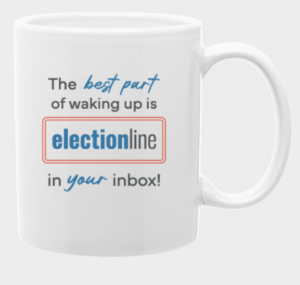 What’s the best part of waking up? electionline Daily News in your inbox of course so be sure to sign up for your daily dose.
What’s the best part of waking up? electionline Daily News in your inbox of course so be sure to sign up for your daily dose.
Each morning you’ll receive the top headlines of the day, plus a listing of states featured in that day’s news round up.
To sign up, simply visit our site and provide us with your email and you’ll begin receiving the news in your inbox each morning.
We Google so you don’t have to!
New Brief on AI
Election Integrity Recommendations for Generative AI Developers
New brief from Center for Democracy and Technology
By Tim Harper, senior policy analyst, Democracy and Elections
Center for Democracy and Technology
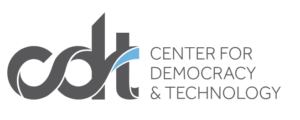 With over 80 countries and more than half of the world’s population going to the polls this year, 2024 represents the largest single year of global elections since the advent of the internet. It has also been dubbed the ‘First AI Election’, in light of the boom in widely accessible generative AI tools that have the potential to accelerate cybersecurity and information integrity challenges to global elections this year.
With over 80 countries and more than half of the world’s population going to the polls this year, 2024 represents the largest single year of global elections since the advent of the internet. It has also been dubbed the ‘First AI Election’, in light of the boom in widely accessible generative AI tools that have the potential to accelerate cybersecurity and information integrity challenges to global elections this year.
Addressing the risks that generative AI poses to elections requires an ecosystem approach. In part, that requires focusing on the distribution of deceptive AI-generated election content on social networks and private messaging services, and through robocalls, TV, and radio. While identifying solutions to the distribution of this content is absolutely necessary — and CDT has supported several initiatives to create voluntary standards for technology companies that help to prevent these risks — it is also necessary to consider the policies and product interventions that generative AI developers should adopt in order to prevent harmful content from being created on or spread through their apps and services.
Although we are halfway through this election year, it remains imperative for AI developers to quickly develop election integrity programs employing a variety of levers including policy, product, and enforcement to protect democratic elections this year and beyond.
Summary of Recommendations
Usage Policies
- Prohibit the generation of realistic images, videos and audio depicting political figures or political and electoral events.
- Prohibit users from conducting political campaign activities or demographic targeting — at least in the short term — and develop transparent goals for longer-term ethical development of political uses of AI.
- Prohibit the use of generative AI ad tools for political advertisements.
- Prohibit any conduct that interferes with elections, including actions that prevent someone from voting; mislead someone into voting differently or not voting at all; or incite, support, or encourage violence against election processes or workers.
- Refrain from using stored memory or other methods of personalization in generating responses to electoral and political queries.
- Refrain from releasing text-to-speech cloning tools that allow users to replicate the natural voice of real people, including political figures.
Product Interventions
- Develop user interface pop-ups or labels relating to known narratives of election mis- and disinformation.
- Disclose how recently your chatbot’s training data was updated when providing responses to time-sensitive election queries.
- Promote, and direct users to, authoritative sources of election-related information.
- Allow users to report policy-violating answers in chatbots and policy-violating apps built using an API.
- Include an appeals option for enforcement actions.
- Commit to develop and embed machine-readable watermarks and metadata into image, video, and audio content using a common standard that social platforms can detect.
Enforcement
- Proactively enforce usage policies on elections at all times, not just during active election periods.
- Consistently deploy product interventions for the most common election lies, and create protocols to quickly deploy product interventions to address newly emerging, election-specific mis- and disinformation.
- Proactively test model answers to common election queries.
- Create escalation channels to accelerate leadership’s visibility into emerging issues, particularly during high risk election periods.
- Adequately resource and staff policy and enforcement teams.
- Institute actor-level enforcement for election integrity policy violations.
Transparency
- Be transparent about election policies.
- Publish regular transparency reports on election mis- and disinformation and deceptive AI usage.
- Consult with civil society and facilitate researcher access to usage data.
- Develop relationships and communication channels with election administrators.
Election Security Updates
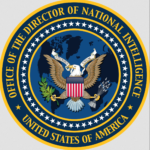 ODNI Updates: The Office of the Director of National Intelligence (ODNI) has recently released two election security updates. The first edition of the report was released back in early July, and the IC assessed that a diverse, growing, and more capable group of foreign actors is or will likely try to influence our elections this November. At this point, the principal actors we are tracking are Russia, China, and Iran. With 100 days (as of July 28) till November 5, ODNI released an update to the original report: The IC continues to observe a range of foreign actors conducting or planning influence operations targeting U.S elections this November. These actors are closely monitoring U.S. political developments, and we expect them to adjust to this month’s developments to promote influence narratives seeking to undermine democratic institutions, foment discord, and/or change public opinion. In general, these foreign actors are conducting broader influence campaigns focused on their core interests and to undermine the United States’ global role, so they are likely to continue to calibrate their efforts to any shift during this election cycle to achieve those objectives. Of note for this cycle, we have observed foreign influence actors refining their tactics to better hide their hand.
ODNI Updates: The Office of the Director of National Intelligence (ODNI) has recently released two election security updates. The first edition of the report was released back in early July, and the IC assessed that a diverse, growing, and more capable group of foreign actors is or will likely try to influence our elections this November. At this point, the principal actors we are tracking are Russia, China, and Iran. With 100 days (as of July 28) till November 5, ODNI released an update to the original report: The IC continues to observe a range of foreign actors conducting or planning influence operations targeting U.S elections this November. These actors are closely monitoring U.S. political developments, and we expect them to adjust to this month’s developments to promote influence narratives seeking to undermine democratic institutions, foment discord, and/or change public opinion. In general, these foreign actors are conducting broader influence campaigns focused on their core interests and to undermine the United States’ global role, so they are likely to continue to calibrate their efforts to any shift during this election cycle to achieve those objectives. Of note for this cycle, we have observed foreign influence actors refining their tactics to better hide their hand.
 DDoS Attacks: This week, as part of their public service announcement series for the 2024 election cycle, the Cybersecurity and Infrastructure Security Agency (CISA) and the Federal Bureau of Investigation (FBI) jointly released Just So You Know: DDoS Attacks Could Hinder Access to Election Information, Would Not Prevent Voting. This public service announcement is to raise awareness that Distributed Denial of Service (DDoS) attacks on election infrastructure, or adjacent infrastructure that supports election operations, could hinder public access to election information, but would not impact the security or integrity of election processes. The PSA is part of the agencies’ ongoing commitment to provide the public with information and the election infrastructure community with the support they need to run safe and
DDoS Attacks: This week, as part of their public service announcement series for the 2024 election cycle, the Cybersecurity and Infrastructure Security Agency (CISA) and the Federal Bureau of Investigation (FBI) jointly released Just So You Know: DDoS Attacks Could Hinder Access to Election Information, Would Not Prevent Voting. This public service announcement is to raise awareness that Distributed Denial of Service (DDoS) attacks on election infrastructure, or adjacent infrastructure that supports election operations, could hinder public access to election information, but would not impact the security or integrity of election processes. The PSA is part of the agencies’ ongoing commitment to provide the public with information and the election infrastructure community with the support they need to run safe and 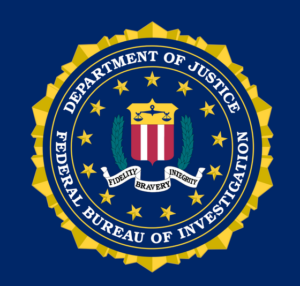 secure elections.“With Election Day less than 100 days away, it is important to help put into context some of the incidents the American public may see during the election cycle that, while potentially causing some minor disruptions, will not fundamentally impact the security or integrity of the democratic process,” said CISA Senior Advisor Cait Conley. “DDoS attacks are one example of a tactic that we have seen used against election infrastructure in the past and will likely see again in the future, but they will NOT affect the security or integrity of the actual election. They may cause some minor disruptions or prevent the public from receiving timely information. It is important to talk about these potential issues now, because nefarious actors, like our foreign adversaries or cybercriminals, could use DDoS incidents to cast doubt on the election systems or processes. An informed public is key to neutralizing the impact of foreign influence operations and disinformation, which is why we put out this advisory on what a DDoS attack could – and couldn’t – do.” This warning highlights the importance for voters to seek out information about how to vote prior to Election Day and demonstrates the FBI’s and CISA’s continued commitment to sharing information with the public about potential cyber threats.” This publication is to help educate the public on what DDoS attacks are, their effects on election infrastructure, recommendations for voters, and victim reporting information.
secure elections.“With Election Day less than 100 days away, it is important to help put into context some of the incidents the American public may see during the election cycle that, while potentially causing some minor disruptions, will not fundamentally impact the security or integrity of the democratic process,” said CISA Senior Advisor Cait Conley. “DDoS attacks are one example of a tactic that we have seen used against election infrastructure in the past and will likely see again in the future, but they will NOT affect the security or integrity of the actual election. They may cause some minor disruptions or prevent the public from receiving timely information. It is important to talk about these potential issues now, because nefarious actors, like our foreign adversaries or cybercriminals, could use DDoS incidents to cast doubt on the election systems or processes. An informed public is key to neutralizing the impact of foreign influence operations and disinformation, which is why we put out this advisory on what a DDoS attack could – and couldn’t – do.” This warning highlights the importance for voters to seek out information about how to vote prior to Election Day and demonstrates the FBI’s and CISA’s continued commitment to sharing information with the public about potential cyber threats.” This publication is to help educate the public on what DDoS attacks are, their effects on election infrastructure, recommendations for voters, and victim reporting information.
Election News This Week
 Voter Registration: This week, Georgia Secretary of State Brad Raffensperger launched a voter registration cancellation website, providing an online method for voters to remove their outdated registrations. Previously, voters had to fill out a cancellation form and return it to their county’s election office. “This is a convenient tool for any voter who wants to secure their voter registration by canceling their old one when they move out of state,” Raffensperger said. “It will also help keep Georgia’s voter registration database up to date without having to rely on postcards being sent and returned by an increasingly inefficient postal system.” Unless voters cancel their own registrations, it can take years to remove them from the rolls. Through the new website, voters who want to cancel their registrations can enter their name, county, date of birth and personal identifying information, such as a driver’s license or state ID number. Then county election officials will receive a notification from the state’s voter registration system and remove those voters. The website can be used by voters who have moved, those who no longer wish to be registered and relatives of voters who have died. County election officials will then send verification letters to voters who cancel their registrations. After the site launched this week, a glitch that allowed people to access a voter’s date of birth, driver’s license number and last four numbers of a Social Security number. That’s the same information needed to verify a person’s identity and allow a registration to be canceled. The problem, which Raffensperger spokesperson Mike Hassinger said lasted less than an hour and has now been fixed, underscored concerns that the site could allow outsiders to unjustifiably cancel voter registrations.
Voter Registration: This week, Georgia Secretary of State Brad Raffensperger launched a voter registration cancellation website, providing an online method for voters to remove their outdated registrations. Previously, voters had to fill out a cancellation form and return it to their county’s election office. “This is a convenient tool for any voter who wants to secure their voter registration by canceling their old one when they move out of state,” Raffensperger said. “It will also help keep Georgia’s voter registration database up to date without having to rely on postcards being sent and returned by an increasingly inefficient postal system.” Unless voters cancel their own registrations, it can take years to remove them from the rolls. Through the new website, voters who want to cancel their registrations can enter their name, county, date of birth and personal identifying information, such as a driver’s license or state ID number. Then county election officials will receive a notification from the state’s voter registration system and remove those voters. The website can be used by voters who have moved, those who no longer wish to be registered and relatives of voters who have died. County election officials will then send verification letters to voters who cancel their registrations. After the site launched this week, a glitch that allowed people to access a voter’s date of birth, driver’s license number and last four numbers of a Social Security number. That’s the same information needed to verify a person’s identity and allow a registration to be canceled. The problem, which Raffensperger spokesperson Mike Hassinger said lasted less than an hour and has now been fixed, underscored concerns that the site could allow outsiders to unjustifiably cancel voter registrations.
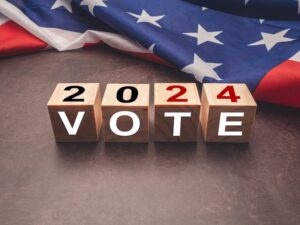 2024 Primaries: The 2024 primary season started up again this week with voters in Arizona heading to the polls on Tuesday. Voters in Tennessee are voting in state and local primaries today (Aug. 1) and voters on Guam and the U.S. Virgin Islands will finish voting on Saturday, Aug. 3. On Aug. 6, Kansas, Michigan, Missouri and Washington complete their primary cycle. After that, there are still 11 states that will hold primaries. It was a relatively smooth day for voting in Arizona on Tuesday with only minor reports of issues. Polls largely opened on time statewide, and lines were minimal throughout the day. Voting was unimpeded by the technical issues that plagued several counties during the 2022 election cycle, outside of a few early printer jams in the Tucson area and a brief printer setup snag in Phoenix. “Today’s primary election across the Grand Canyon State has been mostly smooth sailing,” said Secretary of State Adrian Fontes, praising poll workers and county election officials for their work. Turnout varied but was lower than expected in Maricopa County. While not on the level of Sharpie Gate, a small number of voters were having issues with ink. Some voters seemed to be using a type of ink that seemed to be fading. “Having seen many ballots over the years filled out in pencil, yellow highlighter, or the use or pink or purple sparkly gel ink, this doesn’t surprise me that the new pen technology with the ability to erase ink mistakes could cause problems,” Lisa Marra, state election director, told a local television station. Many Republican state and county officials in Arizona who have defended the fairness of the state’s elections appeared to have lost primary races Tuesday to challengers who campaigned at least in part on the idea of stolen or broken elections. That included Maricopa County’s Stephen Richer.
2024 Primaries: The 2024 primary season started up again this week with voters in Arizona heading to the polls on Tuesday. Voters in Tennessee are voting in state and local primaries today (Aug. 1) and voters on Guam and the U.S. Virgin Islands will finish voting on Saturday, Aug. 3. On Aug. 6, Kansas, Michigan, Missouri and Washington complete their primary cycle. After that, there are still 11 states that will hold primaries. It was a relatively smooth day for voting in Arizona on Tuesday with only minor reports of issues. Polls largely opened on time statewide, and lines were minimal throughout the day. Voting was unimpeded by the technical issues that plagued several counties during the 2022 election cycle, outside of a few early printer jams in the Tucson area and a brief printer setup snag in Phoenix. “Today’s primary election across the Grand Canyon State has been mostly smooth sailing,” said Secretary of State Adrian Fontes, praising poll workers and county election officials for their work. Turnout varied but was lower than expected in Maricopa County. While not on the level of Sharpie Gate, a small number of voters were having issues with ink. Some voters seemed to be using a type of ink that seemed to be fading. “Having seen many ballots over the years filled out in pencil, yellow highlighter, or the use or pink or purple sparkly gel ink, this doesn’t surprise me that the new pen technology with the ability to erase ink mistakes could cause problems,” Lisa Marra, state election director, told a local television station. Many Republican state and county officials in Arizona who have defended the fairness of the state’s elections appeared to have lost primary races Tuesday to challengers who campaigned at least in part on the idea of stolen or broken elections. That included Maricopa County’s Stephen Richer.
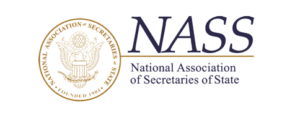 Not Lost in Translation: The National Association of Secretaries of State (NASS) is now offering over 100 languages on the association’s websites NASS.org and CanIVote.org to help ensure individuals whose primary language is not English can easily access its information and resources. “Expanding access to NASS’s helpful information has never been more crucial, especially as Americans prepare for Election Day,” said Steve Simon, NASS President and Minnesota Secretary of State. “As the proud son of an immigrant, I know firsthand how vital it can be to provide technical documents and materials in a person’s native language—even when they are able to speak and write English fluently. I thank NASS for providing this tool to further help people successfully participate in our democracy.” The Google™ Translate function will be available across all NASS webpages including those on business services, cybersecurity, election administration, events, news releases, and more. “Modernizing the NASS website by adding Google Translate ensures citizens may successfully access the voting and business services information needed for success. Accessibility is a key component of our work as state executives, and we encourage all members to consider incorporating in their own states,” said Michael Watson, NASS President-elect and Mississippi Secretary of State. A full list of languages available can be viewed here.
Not Lost in Translation: The National Association of Secretaries of State (NASS) is now offering over 100 languages on the association’s websites NASS.org and CanIVote.org to help ensure individuals whose primary language is not English can easily access its information and resources. “Expanding access to NASS’s helpful information has never been more crucial, especially as Americans prepare for Election Day,” said Steve Simon, NASS President and Minnesota Secretary of State. “As the proud son of an immigrant, I know firsthand how vital it can be to provide technical documents and materials in a person’s native language—even when they are able to speak and write English fluently. I thank NASS for providing this tool to further help people successfully participate in our democracy.” The Google™ Translate function will be available across all NASS webpages including those on business services, cybersecurity, election administration, events, news releases, and more. “Modernizing the NASS website by adding Google Translate ensures citizens may successfully access the voting and business services information needed for success. Accessibility is a key component of our work as state executives, and we encourage all members to consider incorporating in their own states,” said Michael Watson, NASS President-elect and Mississippi Secretary of State. A full list of languages available can be viewed here.
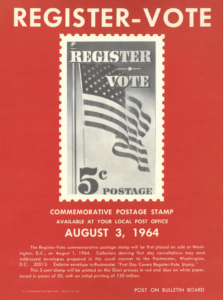 Vote by Mail: Voting by mail did not start during the Covid-19 pandemic. It began in various forms during the Civil War when soldiers could not get home to vote, and it picked up steam again during World War II for the same reason. Mail has been and continues to be a method for providing citizens with access to election information and materials. Today, every state has some form of voting by mail. The National Postal Museum’s exhibition “Voting by Mail: Civil War to Covid-19” explores the significant role of voting by mail in America’s democracy. Over time, legislation for both military and civilian voting using the mail has been shaped by events and politics with provisions added, removed and amended. On view Saturday, Aug. 24, through Feb. 23, 2025, “Voting by Mail” invites visitors to explore the changing logistical and political reasons for the various ways mail has been part of the election process, and how it continues to define where, when and how Americans vote in elections. Early methods for absentee voting that used the mail enabled military members to participate in elections when wartime deployments took them away from their polling precincts. The Civil War and World War II caused many states to temporarily establish or expand absentee voting for significant numbers of voters in the military. Allowances for civilians voting absentee grew in the early 20th century and in 1901 Kansas became the first state to permit voting by mail but limited this to railroad employees traveling for work. Since the 1980s, in addition to in-person voting, some jurisdictions, including eight states and the District of Columbia, have instituted all-mail voting with the automatic distribution of ballots to registered voters. The public health emergency of the Covid-19 pandemic brought about temporary procedures, new laws and debates over using the mail for voting.
Vote by Mail: Voting by mail did not start during the Covid-19 pandemic. It began in various forms during the Civil War when soldiers could not get home to vote, and it picked up steam again during World War II for the same reason. Mail has been and continues to be a method for providing citizens with access to election information and materials. Today, every state has some form of voting by mail. The National Postal Museum’s exhibition “Voting by Mail: Civil War to Covid-19” explores the significant role of voting by mail in America’s democracy. Over time, legislation for both military and civilian voting using the mail has been shaped by events and politics with provisions added, removed and amended. On view Saturday, Aug. 24, through Feb. 23, 2025, “Voting by Mail” invites visitors to explore the changing logistical and political reasons for the various ways mail has been part of the election process, and how it continues to define where, when and how Americans vote in elections. Early methods for absentee voting that used the mail enabled military members to participate in elections when wartime deployments took them away from their polling precincts. The Civil War and World War II caused many states to temporarily establish or expand absentee voting for significant numbers of voters in the military. Allowances for civilians voting absentee grew in the early 20th century and in 1901 Kansas became the first state to permit voting by mail but limited this to railroad employees traveling for work. Since the 1980s, in addition to in-person voting, some jurisdictions, including eight states and the District of Columbia, have instituted all-mail voting with the automatic distribution of ballots to registered voters. The public health emergency of the Covid-19 pandemic brought about temporary procedures, new laws and debates over using the mail for voting.
 Podcast News: The latest episode of High Turnout Wide Margins is now live on electionline. In this episode, hosts Eric Fey and Brianna Lennon speak with some new election administrators in the state of Missouri – all of whom have been in the job less than four years, and are now preparing for their first presidential election. They spoke about Rachel Lightfoot in Polk County, Heather Hall, the Republican Director of the Election Board in Clay County, and Adrienne Lee in Vernon County. They each spoke about how the job has been doing so far, some of the challenges they’ve faced and what they are looking forward to in November. In the latest episode of the American Enterprise Institute’s The Voting Booth podcast, co-hosts John Fortier and Don Palmer discuss how President Biden’s dropping out of the presidential election affects the administration of the 2024 elections. The Colorado In Depth podcast takes a look at the recently underway trial of former Mesa County Clerk Tina Peters. The podcast was produced earlier this year when Peters’ trial was initially set to begin in February. The latest episode of The Other Side podcast Senate Elections Chairman Jeremy England tells Mississippi Today’s Geoff Pender and Taylor Vance that he plans again in the 2025 legislative session to push for in-person early voting and for campaign finance reform — measures he introduced this year that were unsuccessful.
Podcast News: The latest episode of High Turnout Wide Margins is now live on electionline. In this episode, hosts Eric Fey and Brianna Lennon speak with some new election administrators in the state of Missouri – all of whom have been in the job less than four years, and are now preparing for their first presidential election. They spoke about Rachel Lightfoot in Polk County, Heather Hall, the Republican Director of the Election Board in Clay County, and Adrienne Lee in Vernon County. They each spoke about how the job has been doing so far, some of the challenges they’ve faced and what they are looking forward to in November. In the latest episode of the American Enterprise Institute’s The Voting Booth podcast, co-hosts John Fortier and Don Palmer discuss how President Biden’s dropping out of the presidential election affects the administration of the 2024 elections. The Colorado In Depth podcast takes a look at the recently underway trial of former Mesa County Clerk Tina Peters. The podcast was produced earlier this year when Peters’ trial was initially set to begin in February. The latest episode of The Other Side podcast Senate Elections Chairman Jeremy England tells Mississippi Today’s Geoff Pender and Taylor Vance that he plans again in the 2025 legislative session to push for in-person early voting and for campaign finance reform — measures he introduced this year that were unsuccessful.
 Sticker News: Soldotna, Alaska officials recently named the winners of the “I Voted” Sticker Design Contest during the Progress Days Block Party. The set of community-created voting stickers will be available at Soldotna polling locations during the Oct. 1 municipal election. Hadley Kornelis, 12-year-old Soldotna Montessori student, won the “Future Voter” category with a depiction of a sockeye salmon against mountains at sunset. Isla Crouse, 15-year-old Kenai Central High School student, won the youth category with her image of a sockeye salmon moving along the riverbank. Addie Nelson won the adult prize with her image of a tent overlooking an ice field. Crouse said her design, centering salmon, was intended to capture an impression of “where we’re from.” Salmon, she said, are something most people who live on the Kenai Peninsula can relate to. “I’m very honored,” she said of being chosen as a winner of the contest. “It’s great to feel that support.” Earlier this year the Groveland Township, Michigan
Sticker News: Soldotna, Alaska officials recently named the winners of the “I Voted” Sticker Design Contest during the Progress Days Block Party. The set of community-created voting stickers will be available at Soldotna polling locations during the Oct. 1 municipal election. Hadley Kornelis, 12-year-old Soldotna Montessori student, won the “Future Voter” category with a depiction of a sockeye salmon against mountains at sunset. Isla Crouse, 15-year-old Kenai Central High School student, won the youth category with her image of a sockeye salmon moving along the riverbank. Addie Nelson won the adult prize with her image of a tent overlooking an ice field. Crouse said her design, centering salmon, was intended to capture an impression of “where we’re from.” Salmon, she said, are something most people who live on the Kenai Peninsula can relate to. “I’m very honored,” she said of being chosen as a winner of the contest. “It’s great to feel that support.” Earlier this year the Groveland Township, Michigan  clerk’s office launched an “I Voted” sticker contest. The contest was open to all students from kindergarten to 12th grade students from Brandon, Holly and Goodrich school districts. A total of 93 students responded and six were selected, two from each school district. Some of the stickers purchased by townships will be available at the polls. The design project was spearheaded by Groveland Township Clerk, Jenell Keller. “This was an idea that I was excited to implement,” said Keller. “I wanted to encourage young children to get involved with the election process and create an ‘excitement’ for it, especially considering the often negative connotation that ‘election’ receives. I was also hoping that these stickers would instill a sense of community in our voters as they proudly wear the children’s stickers as their badge of honor for participating in the election process.”
clerk’s office launched an “I Voted” sticker contest. The contest was open to all students from kindergarten to 12th grade students from Brandon, Holly and Goodrich school districts. A total of 93 students responded and six were selected, two from each school district. Some of the stickers purchased by townships will be available at the polls. The design project was spearheaded by Groveland Township Clerk, Jenell Keller. “This was an idea that I was excited to implement,” said Keller. “I wanted to encourage young children to get involved with the election process and create an ‘excitement’ for it, especially considering the often negative connotation that ‘election’ receives. I was also hoping that these stickers would instill a sense of community in our voters as they proudly wear the children’s stickers as their badge of honor for participating in the election process.”
Personnel News: Sherri Allen has been nominated to chair the Fulton County, Georgia Board of Registration & Elections. Steve Hahn has been hired as the new Luzerne County, Pennsylvania elections director. Melanie Bailey is the new director of elections for Centre County, Pennsylvania. Barbara Binetti is the new Hayden, Colorado clerk. Lauren Staley Ferry has resigned as the Will County, Illinois clerk to take on a similar role in the city of Joliet. Hampton, New Hampshire town clerk, Shirley Doheny has been directed to resign. Pasquotank County deputy elections director Troy White has resigned.
New Research and Resources
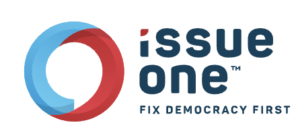 Poll Worker Resources: In honor of National Poll Worker Day, this week, Issue One released 8 Creative Ways New Poll Workers Are Being Recruited in 2024. Despite their essential role, election jurisdictions are finding it hard to recruit poll workers. To combat this problem, election administrators are finding creative ways to expand this much needed temporary workforce. This report highlights eight creative ways that election officials and their
Poll Worker Resources: In honor of National Poll Worker Day, this week, Issue One released 8 Creative Ways New Poll Workers Are Being Recruited in 2024. Despite their essential role, election jurisdictions are finding it hard to recruit poll workers. To combat this problem, election administrators are finding creative ways to expand this much needed temporary workforce. This report highlights eight creative ways that election officials and their  allies are rising to the occasion and working to recruit more poll workers this year — from partnering with high schools and colleges to working with bilingual residents who can assist underserved voters to establishing programs where groups “adopt” specific polling places. “You’re either part of the problem or part of the solution. I think each of us owe it to give something back to the community, and one of the ways that we can give back is by working the polls and understanding that every vote counts.” – Nedra Cooper, a poll worker and trainer from Nevada and member of Issue One’s Faces of Democracy campaign. Additionally, the National Association of Counties has an explainer about some of the work various counties are doing to recruit poll workers.
allies are rising to the occasion and working to recruit more poll workers this year — from partnering with high schools and colleges to working with bilingual residents who can assist underserved voters to establishing programs where groups “adopt” specific polling places. “You’re either part of the problem or part of the solution. I think each of us owe it to give something back to the community, and one of the ways that we can give back is by working the polls and understanding that every vote counts.” – Nedra Cooper, a poll worker and trainer from Nevada and member of Issue One’s Faces of Democracy campaign. Additionally, the National Association of Counties has an explainer about some of the work various counties are doing to recruit poll workers.
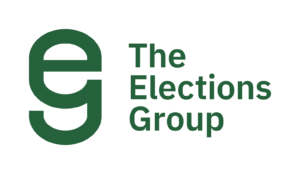 Communications: Could your office use social media and website graphics, PSA scripts and press releases timed with the election calendar? The Elections Group just updated its Elections Communications Plan, with 60 ways to reach voters over 60 days, counting down to Election Day. All materials are ready to be customized for your jurisdiction. Our Communications Resource Desk team is here to help election officials with communications tasks large and small. If you could use some help, we can add your office’s logo and website URL to the graphics or personalize the PSA scripts or press release templates. Just send us a note using the button below, and we’ll be in touch to see how we can assist with these or other communications resources.
Communications: Could your office use social media and website graphics, PSA scripts and press releases timed with the election calendar? The Elections Group just updated its Elections Communications Plan, with 60 ways to reach voters over 60 days, counting down to Election Day. All materials are ready to be customized for your jurisdiction. Our Communications Resource Desk team is here to help election officials with communications tasks large and small. If you could use some help, we can add your office’s logo and website URL to the graphics or personalize the PSA scripts or press release templates. Just send us a note using the button below, and we’ll be in touch to see how we can assist with these or other communications resources.
Legislation and Rulemaking Updates
 Federal Legislation: Embedded inside this year’s Intelligence Authorization Act, which funds intelligence agencies like the CIA, is the Strengthening Election Cybersecurity to Uphold Respect for Elections through Independent Testing (SECURE IT) Act, which would require penetration testing of federally certified voting machines and ballot scanners, and create a pilot program exploring the feasibility of letting independent researchers probe all manner of election systems for flaws. The SECURE IT Act—originally introduced by US senators Mark Warner, a Virginia Democrat, and Susan Collins, a Maine Republican—could significantly improve the security of key election technology in an era when foreign adversaries remain intent on undermining US democracy. “This legislation will empower our researchers to think the way our adversaries do, and expose hidden vulnerabilities by attempting to penetrate our systems with the same tools and methods used by bad actors,” says Warner, who chairs the Senate Intelligence Committee. The first provision would codify the US Election Assistance Commission’s recent addition of penetration testing to its certification process.The bill’s second provision would require the EAC to experiment with a vulnerability disclosure program for election technology—including systems that are not subject to federal testing, such as voter registration databases and election results websites. The bill would require manufacturers to patch or otherwise mitigate serious reported vulnerabilities within 180 days of confirming them. The EAC—which must review all changes to certified voting software—would have 90 days to approve fixes; any fix not approved within that timetable would be “deemed to be certified,” though the commission could review it later. The SECURE IT Act doesn’t authorize any new money for the EAC to run these programs.
Federal Legislation: Embedded inside this year’s Intelligence Authorization Act, which funds intelligence agencies like the CIA, is the Strengthening Election Cybersecurity to Uphold Respect for Elections through Independent Testing (SECURE IT) Act, which would require penetration testing of federally certified voting machines and ballot scanners, and create a pilot program exploring the feasibility of letting independent researchers probe all manner of election systems for flaws. The SECURE IT Act—originally introduced by US senators Mark Warner, a Virginia Democrat, and Susan Collins, a Maine Republican—could significantly improve the security of key election technology in an era when foreign adversaries remain intent on undermining US democracy. “This legislation will empower our researchers to think the way our adversaries do, and expose hidden vulnerabilities by attempting to penetrate our systems with the same tools and methods used by bad actors,” says Warner, who chairs the Senate Intelligence Committee. The first provision would codify the US Election Assistance Commission’s recent addition of penetration testing to its certification process.The bill’s second provision would require the EAC to experiment with a vulnerability disclosure program for election technology—including systems that are not subject to federal testing, such as voter registration databases and election results websites. The bill would require manufacturers to patch or otherwise mitigate serious reported vulnerabilities within 180 days of confirming them. The EAC—which must review all changes to certified voting software—would have 90 days to approve fixes; any fix not approved within that timetable would be “deemed to be certified,” though the commission could review it later. The SECURE IT Act doesn’t authorize any new money for the EAC to run these programs.
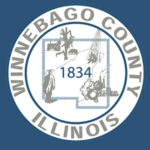 Winnebago County, Illinois: Voters in November may get to weigh in on a possible change to how elections are run in Winnebago County. On August 1, the county’s Operations and Administrative Committee is expected to discuss whether to put a referendum on the upcoming ballot. It would ask voters if the Rockford Board of Elections Commissioners should consolidate with the County Clerk’s election division in order to save taxpayers money. Currently, the two bodies operate independently with the Board of Elections handling operations within city limits. It is guided by a bipartisan group of three people who are appointed by the circuit court. Rockford voters approved the commission in 1910. The Winnebago County Clerk oversees voting in the remainder of the county.
Winnebago County, Illinois: Voters in November may get to weigh in on a possible change to how elections are run in Winnebago County. On August 1, the county’s Operations and Administrative Committee is expected to discuss whether to put a referendum on the upcoming ballot. It would ask voters if the Rockford Board of Elections Commissioners should consolidate with the County Clerk’s election division in order to save taxpayers money. Currently, the two bodies operate independently with the Board of Elections handling operations within city limits. It is guided by a bipartisan group of three people who are appointed by the circuit court. Rockford voters approved the commission in 1910. The Winnebago County Clerk oversees voting in the remainder of the county.
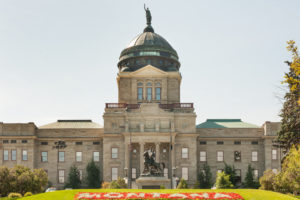 Montana: Legislators have taken the first step towards potentially becoming the 44th state to allow online voter registration. In an 8-2 vote on July 31, the State Administration and Veterans’ Affairs Interim Committee voted to have a provisional bill drafted. The committee heard testimony from election experts and Montana’s Motor Vehicle Division about the specifics of how the process works and their options. It comes two months after the group Secure Democracy USA urged the legislators to move forward with the proposal. Although the proposal has bipartisan support, one Republican expressed concern about security. “Granted, I’m a dinosaur and I have trouble understanding all of the electronic processes. But I don’t trust all of them. And especially with the increasing development of artificial intelligence and robotic kind of answers,” said State Sen. Mike Cuffe (R-Eureka). “When we talk to people who are under 40, I’m finding that they are shocked that this is the one thing they can’t do online. Security could easily be dealt with. We deal with it with motor vehicles. We deal with, the bigger threat, if you want to say there’s a threat, is to the voter registration system as opposed to the online piece of it. and that seems to be well, well under control,” said State Rep. Ed Stafman (D-Bozeman), the legislator who brought the motion up for a vote. The bill draft will be presented at their September meeting, and members could then vote to advance it to the 2025 session as a committee bill. The Secretary of State’s office did not participate in the discussion despite being requested to do so, according to Stafman.
Montana: Legislators have taken the first step towards potentially becoming the 44th state to allow online voter registration. In an 8-2 vote on July 31, the State Administration and Veterans’ Affairs Interim Committee voted to have a provisional bill drafted. The committee heard testimony from election experts and Montana’s Motor Vehicle Division about the specifics of how the process works and their options. It comes two months after the group Secure Democracy USA urged the legislators to move forward with the proposal. Although the proposal has bipartisan support, one Republican expressed concern about security. “Granted, I’m a dinosaur and I have trouble understanding all of the electronic processes. But I don’t trust all of them. And especially with the increasing development of artificial intelligence and robotic kind of answers,” said State Sen. Mike Cuffe (R-Eureka). “When we talk to people who are under 40, I’m finding that they are shocked that this is the one thing they can’t do online. Security could easily be dealt with. We deal with it with motor vehicles. We deal with, the bigger threat, if you want to say there’s a threat, is to the voter registration system as opposed to the online piece of it. and that seems to be well, well under control,” said State Rep. Ed Stafman (D-Bozeman), the legislator who brought the motion up for a vote. The bill draft will be presented at their September meeting, and members could then vote to advance it to the 2025 session as a committee bill. The Secretary of State’s office did not participate in the discussion despite being requested to do so, according to Stafman.
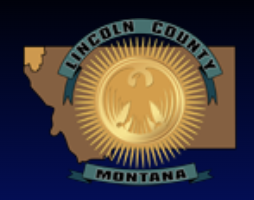 Lincoln County, Montana: After Election Administrator Melanie Howell approached them with the idea, the Lincoln County, Montana Commission is considering separating the Election Department from the Clerk and Recorder’s Office. Howell and assistant Sierra Gustin cited many reasons for wanting to split the operations of the offices. Howell also cited state code that the clerk and recorder is the default election administrator unless another is appointed. District 1 Commissioner Brent Teske wanted the proposal run by Lincoln County Attorney Marcia Boris. Howell also mentioned other counties such as Missoula, Glacier, Bighorn and Cascade that she said have separated the election department from the clerk and recorder’s Office with no detriment. District 3 Commissioner Josh Letcher said he understood the drive for secure elections, but also saw the need for cross-training in both offices so Election Department employees can help in the Clerk and Recorder’s Office during the off season. Commissioners are expected to continue discussing the proposal at their Aug. 7 meeting.
Lincoln County, Montana: After Election Administrator Melanie Howell approached them with the idea, the Lincoln County, Montana Commission is considering separating the Election Department from the Clerk and Recorder’s Office. Howell and assistant Sierra Gustin cited many reasons for wanting to split the operations of the offices. Howell also cited state code that the clerk and recorder is the default election administrator unless another is appointed. District 1 Commissioner Brent Teske wanted the proposal run by Lincoln County Attorney Marcia Boris. Howell also mentioned other counties such as Missoula, Glacier, Bighorn and Cascade that she said have separated the election department from the clerk and recorder’s Office with no detriment. District 3 Commissioner Josh Letcher said he understood the drive for secure elections, but also saw the need for cross-training in both offices so Election Department employees can help in the Clerk and Recorder’s Office during the off season. Commissioners are expected to continue discussing the proposal at their Aug. 7 meeting.
Legal Updates
 Alabama: The Alabama attorney general’s office described a new ban on providing voters with absentee ballot application assistance as “commonsense ballot integrity,” while lawyers challenging the restrictions said they have halted important civic work in the community. The diverging depictions of the new law were aired during a federal hearing on Alabama’s request to dismiss a lawsuit challenging the statute. U.S. District Judge R. David Proctor did not indicate when he would rule, but said he understood the two sides want a decision before the November general election. The new law, originally known as Senate Bill 1, puts restrictions on who can fill out and return a voter’s application form to receive an absentee ballot. It makes it illegal to distribute an absentee ballot application that is prefilled with information such as the voter’s name, or to return another person’s absentee ballot application. And it is a felony punishable by up to 20 years in prison to give, or receive, a payment or a gift “for distributing, ordering, requesting, collecting, completing, prefilling, obtaining, or delivering a voter’s absentee ballot application.” During the hearing, Alabama Solicitor General Edmund LaCour described the law as a ballot-integrity measure that prevents paid operatives from corralling votes through absentee ballots. “SB1 helps fight fraud and confusion by ensuring that the absentee ballot application process remains in the hands of voters,” LaCour told Proctor. He argued that there are exceptions for disabled voters who need assistance.
Alabama: The Alabama attorney general’s office described a new ban on providing voters with absentee ballot application assistance as “commonsense ballot integrity,” while lawyers challenging the restrictions said they have halted important civic work in the community. The diverging depictions of the new law were aired during a federal hearing on Alabama’s request to dismiss a lawsuit challenging the statute. U.S. District Judge R. David Proctor did not indicate when he would rule, but said he understood the two sides want a decision before the November general election. The new law, originally known as Senate Bill 1, puts restrictions on who can fill out and return a voter’s application form to receive an absentee ballot. It makes it illegal to distribute an absentee ballot application that is prefilled with information such as the voter’s name, or to return another person’s absentee ballot application. And it is a felony punishable by up to 20 years in prison to give, or receive, a payment or a gift “for distributing, ordering, requesting, collecting, completing, prefilling, obtaining, or delivering a voter’s absentee ballot application.” During the hearing, Alabama Solicitor General Edmund LaCour described the law as a ballot-integrity measure that prevents paid operatives from corralling votes through absentee ballots. “SB1 helps fight fraud and confusion by ensuring that the absentee ballot application process remains in the hands of voters,” LaCour told Proctor. He argued that there are exceptions for disabled voters who need assistance.
 Alaska: Supporters of Alaska’s ranked choice election system are asking the Alaska Supreme Court to rule on one final attempt to keep a repeal measure from this November’s ballot. Earlier this month, Anchorage Superior Court Judge Christina Rankin ruled that there was insufficient evidence to disqualify the measure from a statewide vote. While Rankin disqualified some signatures from a petition seeking to force a repeal vote, a recount by the Alaska Division of Elections confirmed that enough signatures remain for that vote to take place. On July 25, opponents of the repeal initiative asked the Alaska Supreme Court to review an element of Rankin’s decision. In a document called a statement of points on appeal, they say Rankin was wrong when she allowed the Alaska Division of Elections to permit signature gatherers the ability to correct minor mistakes with the ballot measure petition after the submission deadline. In June, Rankin wrote that the division has allowed petitioners the ability to correct minor mistakes as far back as 2015 and that it is allowed under a 2006 Alaska Supreme Court decision that said in part “that the right to initiative is not to be defeated by technical rule violations.” If the high court rules against Rankin’s decision, it could leave petitioners with insufficient signatures for a 2024 vote. The Supreme Court has set an accelerated timeline to hear the case, with written arguments scheduled to finish by Aug. 19. The court has scheduled oral arguments for Aug. 22, two days after the statewide primary election. The court must rule quickly: Ballot designs must be ready in time for ballots to be printed and mailed to overseas voters by Sept. 21.
Alaska: Supporters of Alaska’s ranked choice election system are asking the Alaska Supreme Court to rule on one final attempt to keep a repeal measure from this November’s ballot. Earlier this month, Anchorage Superior Court Judge Christina Rankin ruled that there was insufficient evidence to disqualify the measure from a statewide vote. While Rankin disqualified some signatures from a petition seeking to force a repeal vote, a recount by the Alaska Division of Elections confirmed that enough signatures remain for that vote to take place. On July 25, opponents of the repeal initiative asked the Alaska Supreme Court to review an element of Rankin’s decision. In a document called a statement of points on appeal, they say Rankin was wrong when she allowed the Alaska Division of Elections to permit signature gatherers the ability to correct minor mistakes with the ballot measure petition after the submission deadline. In June, Rankin wrote that the division has allowed petitioners the ability to correct minor mistakes as far back as 2015 and that it is allowed under a 2006 Alaska Supreme Court decision that said in part “that the right to initiative is not to be defeated by technical rule violations.” If the high court rules against Rankin’s decision, it could leave petitioners with insufficient signatures for a 2024 vote. The Supreme Court has set an accelerated timeline to hear the case, with written arguments scheduled to finish by Aug. 19. The court has scheduled oral arguments for Aug. 22, two days after the statewide primary election. The court must rule quickly: Ballot designs must be ready in time for ballots to be printed and mailed to overseas voters by Sept. 21.
 Arizona: Brian Jerry Ogstad, 60, of Cullman, Alabama, pleaded guilty July 25 to sending threatening messages to Arizona election workers during and after the 2022 primaries. Ogstad sent 18 Instagram direct messages to an account run by the Maricopa County Election Department in August 2022, the majority of which contained threats on election workers’ lives. Ogstad was indicted and arrested in February 2024, and at his subsequent arraignment he pleaded not guilty to five felony counts of interstate threats. He decided to change his plea on July 2, pleading guilty to one of the five counts Thursday afternoon before U.S. Magistrate Judge John Boyle. “This guilty plea should send a message to anyone who tries to take the rule of law into their own hands through vigilante justice,” U.S. Attorney Gary Restaino said in an email to Courthouse News. “But it also showcases the resilience of public servants. Thanks to the election professionals in Maricopa County who have worked courageously to maintain free and fair elections in spite of the threats received.” Ogstad pleaded guilty to a class D felony, carrying a maximum sentence of five years in prison and up to $20,000 in restitution to the victims, none of whom appeared in court Thursday afternoon. The four remaining counts will be dropped at sentencing, scheduled for Oct. 1, according to the plea agreement.
Arizona: Brian Jerry Ogstad, 60, of Cullman, Alabama, pleaded guilty July 25 to sending threatening messages to Arizona election workers during and after the 2022 primaries. Ogstad sent 18 Instagram direct messages to an account run by the Maricopa County Election Department in August 2022, the majority of which contained threats on election workers’ lives. Ogstad was indicted and arrested in February 2024, and at his subsequent arraignment he pleaded not guilty to five felony counts of interstate threats. He decided to change his plea on July 2, pleading guilty to one of the five counts Thursday afternoon before U.S. Magistrate Judge John Boyle. “This guilty plea should send a message to anyone who tries to take the rule of law into their own hands through vigilante justice,” U.S. Attorney Gary Restaino said in an email to Courthouse News. “But it also showcases the resilience of public servants. Thanks to the election professionals in Maricopa County who have worked courageously to maintain free and fair elections in spite of the threats received.” Ogstad pleaded guilty to a class D felony, carrying a maximum sentence of five years in prison and up to $20,000 in restitution to the victims, none of whom appeared in court Thursday afternoon. The four remaining counts will be dropped at sentencing, scheduled for Oct. 1, according to the plea agreement.
The Arizona Free Enterprise Club filed a lawsuit over the constitutionality of the Make Elections Fair Act, a ballot initiative that would institute open primaries in the state. The group says it violates the Arizona Constitution by having several amendments in a single ballot measure. The defendants involved include Secretary of State Adrian Fontes and political committee Make Elections Fair AZ. The Arizona Free Enterprise Club points to the other changes made by the initiative, such as the integration of ranked choice voting in the general election. Earlier this month, Make Elections Fair AZ alleged Republican legislators misled voters about the ballot measure. The Arizona Free Enterprise Club has also filed a lawsuit alleging more than half of petition signatures used to get the open-primary measure on the November ballot are illegal.
Maricopa County Superior Court Judge Jennifer Ryan-Touhill said this week that she finds “troubling” some rules enacted by the secretary of state that she says could lead to people being charged with crimes for exercising their First Amendment rights on Election Day. Ryan-Touhill said the wording of the Elections Procedures Manual could be read to make it illegal for someone to wear a T-shirt into a polling place that criticized one of the candidates on the ballot. And she said she also is concerned about prohibitions in the manual against harassment and intimidation. Assistant Attorney General Josh Whitaker told the judge there is no basis for her concerns. He said the manual is designed to be “guidance” for election workers, with no basis to apply its provisions to the general public. Anyway, he said, the manual does not — and cannot — expand the laws approved by the Legislature. Ryan-Touhill was not convinced. “The problem is that the words that were chosen … have very specific meanings and consequences in a legal sense,” she said, words she said that appear to have the provisions apply to all. Add to that, said the judge, is that the manual has the force of law, with violations carrying four months in jail and a $750 fine. On top of that, she said, what the manual appears to criminalize are certain behaviors, complete with examples, like raising one’s voice.
 Colorado: The trial of former Mesa County Clerk Tina Peters got underway this week. During opening statements, an attorney for Peters said Peters was trying to prevent voting information from being erased. Under the laws in place in 2021, when Peters allowed a man who prosecutors say was working with MyPillow CEO Mike Lindell to make a copy of a Dominion Voting Systems computer’s hard drive, she was allowed to hire a “consultant” to make such a copy, defense attorney Amy Jones said during opening statements. “She believed she needed to save that data,” said Jones, who did not deny that a copy was made. But prosecutor Robert Shapiro portrayed the man as a “cyber mercenary” who Peters brought in without conducting a background check and committed identity theft by passing him off as another person who had obtained clearance to work for her office. He said Peters contacted the man, who has not been charged, after she met with Douglas Frank, another person working with Lindell, one of the nation’s most prominent election conspiracy theorists. Frank, an Ohio math teacher, had been traveling around the country looking for evidence of voter fraud when he met with Peters and she hatched the plan, he said. The trial began after several delays, Peters’ failed bid to become Colorado’s secretary of state and her decision to change attorneys on the eve of a trial date in February. The jury was seated July 31 after being questioned by lawyers earlier in the day. Peters is charged with three counts of attempting to influence a public servant, criminal impersonation, two counts of conspiracy to commit criminal impersonation, one count of identity theft, first-degree official misconduct, violation of duty and failing to comply with the secretary of state.
Colorado: The trial of former Mesa County Clerk Tina Peters got underway this week. During opening statements, an attorney for Peters said Peters was trying to prevent voting information from being erased. Under the laws in place in 2021, when Peters allowed a man who prosecutors say was working with MyPillow CEO Mike Lindell to make a copy of a Dominion Voting Systems computer’s hard drive, she was allowed to hire a “consultant” to make such a copy, defense attorney Amy Jones said during opening statements. “She believed she needed to save that data,” said Jones, who did not deny that a copy was made. But prosecutor Robert Shapiro portrayed the man as a “cyber mercenary” who Peters brought in without conducting a background check and committed identity theft by passing him off as another person who had obtained clearance to work for her office. He said Peters contacted the man, who has not been charged, after she met with Douglas Frank, another person working with Lindell, one of the nation’s most prominent election conspiracy theorists. Frank, an Ohio math teacher, had been traveling around the country looking for evidence of voter fraud when he met with Peters and she hatched the plan, he said. The trial began after several delays, Peters’ failed bid to become Colorado’s secretary of state and her decision to change attorneys on the eve of a trial date in February. The jury was seated July 31 after being questioned by lawyers earlier in the day. Peters is charged with three counts of attempting to influence a public servant, criminal impersonation, two counts of conspiracy to commit criminal impersonation, one count of identity theft, first-degree official misconduct, violation of duty and failing to comply with the secretary of state.
 Georgia: Judge Kellie Hill ruled on July 25 that Cobb County’s electoral map is unconstitutional, the primary elections conducted in May for County Commission Districts 2 and 4 will have to be redone, and the November general election for those seats must be postponed. Residents of Districts 2 and 4 who just voted in the May primary election, and in the District 2 runoff, will have to do it all over again — likely in 2025. An election do-over, while extremely rare in Georgia, will allow individuals to run for office who were unable to qualify for this year’s election because they lived outside the district lines in the county-passed map. The order is the second case out of Cobb Superior Court tossing out the county’s unprecedented, self-passed map. The first case, filed by voters and a sitting commissioner, was appealed to the Georgia Supreme Court and then dismissed on procedural grounds. Hill ruled in favor of plaintiff Alicia Adams, a candidate who was disqualified from running for office because she did not live in District 2 under the county map. The Cobb Board of Elections is unlikely to appeal the ruling due to its continued neutral stance on the map’s legality. Elections Board Chair Tori Silas said that while still processing the decision, the board is “glad to have finally received guidance from a court.”
Georgia: Judge Kellie Hill ruled on July 25 that Cobb County’s electoral map is unconstitutional, the primary elections conducted in May for County Commission Districts 2 and 4 will have to be redone, and the November general election for those seats must be postponed. Residents of Districts 2 and 4 who just voted in the May primary election, and in the District 2 runoff, will have to do it all over again — likely in 2025. An election do-over, while extremely rare in Georgia, will allow individuals to run for office who were unable to qualify for this year’s election because they lived outside the district lines in the county-passed map. The order is the second case out of Cobb Superior Court tossing out the county’s unprecedented, self-passed map. The first case, filed by voters and a sitting commissioner, was appealed to the Georgia Supreme Court and then dismissed on procedural grounds. Hill ruled in favor of plaintiff Alicia Adams, a candidate who was disqualified from running for office because she did not live in District 2 under the county map. The Cobb Board of Elections is unlikely to appeal the ruling due to its continued neutral stance on the map’s legality. Elections Board Chair Tori Silas said that while still processing the decision, the board is “glad to have finally received guidance from a court.”
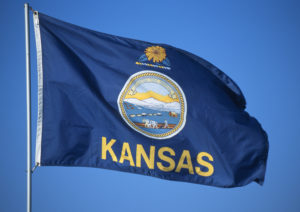 Kansas: According to The Associated Press, Kansas is no longer enforcing a 3-year-old law making it a felony to impersonate election officials as it faces a legal challenge from critics who argue that the law has hindered efforts to register new voters. Attorneys for the state and groups suing over the law agreed on stopping its enforcement, and District Judge Teresa Watson in Shawnee County, issued an order earlier this week ratifying their agreement. Her order will remain in effect at least until another court hearing after the November election. The law made “falsely representing” an elections official punishable by up to 13 months in prison for a first-time offender, though two years’ probation would have been the most likely sentence. The crime includes causing someone to believe another person is an election official. The Republican-controlled Legislature enacted the law in 2021 by overriding a veto by Democratic Gov. Laura Kelly. The groups challenging the law argue it’s so vague that volunteers who register voters could face criminal charges if someone mistakenly believes they are election officials, even if those volunteers are clear that they aren’t verbally, in writing or on signs. Watson initially refused in 2021 to block the law’s enforcement and a state Court of Appeals panel later dismissed the case. But in December, the Kansas Supreme Court revived it, saying the law is vague enough for the groups to contest it.
Kansas: According to The Associated Press, Kansas is no longer enforcing a 3-year-old law making it a felony to impersonate election officials as it faces a legal challenge from critics who argue that the law has hindered efforts to register new voters. Attorneys for the state and groups suing over the law agreed on stopping its enforcement, and District Judge Teresa Watson in Shawnee County, issued an order earlier this week ratifying their agreement. Her order will remain in effect at least until another court hearing after the November election. The law made “falsely representing” an elections official punishable by up to 13 months in prison for a first-time offender, though two years’ probation would have been the most likely sentence. The crime includes causing someone to believe another person is an election official. The Republican-controlled Legislature enacted the law in 2021 by overriding a veto by Democratic Gov. Laura Kelly. The groups challenging the law argue it’s so vague that volunteers who register voters could face criminal charges if someone mistakenly believes they are election officials, even if those volunteers are clear that they aren’t verbally, in writing or on signs. Watson initially refused in 2021 to block the law’s enforcement and a state Court of Appeals panel later dismissed the case. But in December, the Kansas Supreme Court revived it, saying the law is vague enough for the groups to contest it.
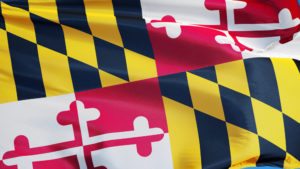 Maryland: The 4th U.S. Circuit Court of Appeals in Richmond has denied a request to expedite a hearing in a case involving the Maryland State Board of Elections and two groups – Maryland Election Integrity LLC and Missouri-based United Sovereign Americans. The groups asked the Court of Appeals for an expedited hearing on July 16, just one week after appealing a district court judge’s rejection of their election security claims. In a one-page order issued July 25, the court declined to fast-track the case. It gave no reason for denying the request. It was the latest in a series of courtroom filings and arguments between the two groups and the elections board. The case began in March when Maryland Election Integrity LLC and Missouri-based United Sovereign Americans sued the Maryland State Board of Elections in the U.S. District Court for Maryland, alleging a number of violations of federal election law. The group claimed that through “meticulous analysis” it found at least 79,392 voter registration violations that allegedly included duplicate registrations, “registrants with questionable inactive status,” and more than 40,000 with “instances of a questionable registration date.” Their complaint also claimed that “voting system error rates are exponentially above the maximum allowable error rates. Inaccuracy and the specter of fraud have irretrievably damaged the reliability and credibility of results.” And the groups said the elections board denied their requests for election reports made under the Maryland Public Information Act. The lawsuit asked U.S. District Court Judge Stephanie A. Gallagher to order the board not to certify the primary election results until the errors were corrected. But Gallagher, in a May decision, dismissed the lawsuit without considering the allegations.
Maryland: The 4th U.S. Circuit Court of Appeals in Richmond has denied a request to expedite a hearing in a case involving the Maryland State Board of Elections and two groups – Maryland Election Integrity LLC and Missouri-based United Sovereign Americans. The groups asked the Court of Appeals for an expedited hearing on July 16, just one week after appealing a district court judge’s rejection of their election security claims. In a one-page order issued July 25, the court declined to fast-track the case. It gave no reason for denying the request. It was the latest in a series of courtroom filings and arguments between the two groups and the elections board. The case began in March when Maryland Election Integrity LLC and Missouri-based United Sovereign Americans sued the Maryland State Board of Elections in the U.S. District Court for Maryland, alleging a number of violations of federal election law. The group claimed that through “meticulous analysis” it found at least 79,392 voter registration violations that allegedly included duplicate registrations, “registrants with questionable inactive status,” and more than 40,000 with “instances of a questionable registration date.” Their complaint also claimed that “voting system error rates are exponentially above the maximum allowable error rates. Inaccuracy and the specter of fraud have irretrievably damaged the reliability and credibility of results.” And the groups said the elections board denied their requests for election reports made under the Maryland Public Information Act. The lawsuit asked U.S. District Court Judge Stephanie A. Gallagher to order the board not to certify the primary election results until the errors were corrected. But Gallagher, in a May decision, dismissed the lawsuit without considering the allegations.
 Mississippi: U.S. District Judge Louis Guirola Jr. dismissed a lawsuit by the Republican National Committee that sought to block Mississippi from counting absentee ballots that are postmarked by Election Day but received up to five days after it. Guirola handed down his ruling July 28, becoming the second federal judge in recent weeks to dismiss such a lawsuit. “Mississippi’s statutory procedure for counting lawfully cast absentee ballots, postmarked on or before election day, and received no more than five business days after election day is consistent with federal law and does not conflict with the Elections Clause, the Electors’ Clause, or the election-day statutes,” Guirola wrote. Another federal judge recently dismissed a similar lawsuit in Nevada, rejecting Republicans’ assertions that counting absentee ballots that are postmarked by Election Day but received days later was unconstitutional and violated federal law. In dismissing the suits, Guirola wrote that “no ‘final selection’ is made after the federal election day under Mississippi’s law. All that occurs after election day is the delivery and counting of ballots cast on or before election day.”
Mississippi: U.S. District Judge Louis Guirola Jr. dismissed a lawsuit by the Republican National Committee that sought to block Mississippi from counting absentee ballots that are postmarked by Election Day but received up to five days after it. Guirola handed down his ruling July 28, becoming the second federal judge in recent weeks to dismiss such a lawsuit. “Mississippi’s statutory procedure for counting lawfully cast absentee ballots, postmarked on or before election day, and received no more than five business days after election day is consistent with federal law and does not conflict with the Elections Clause, the Electors’ Clause, or the election-day statutes,” Guirola wrote. Another federal judge recently dismissed a similar lawsuit in Nevada, rejecting Republicans’ assertions that counting absentee ballots that are postmarked by Election Day but received days later was unconstitutional and violated federal law. In dismissing the suits, Guirola wrote that “no ‘final selection’ is made after the federal election day under Mississippi’s law. All that occurs after election day is the delivery and counting of ballots cast on or before election day.”
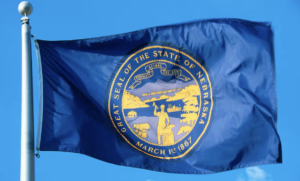 Nebraska: Voting rights advocates sued Nebraska Secretary of State Bob Evnen on July 29, arguing that he unconstitutionally instructed county election officials to ignore a new state law letting people convicted of felonies vote after serving their sentence. The lawsuit, bound for the Nebraska Supreme Court, clarified arguments that supporters of felon voting rights made two weeks ago, stating that only courts can stop a law, that the will of voters and lawmakers is being ignored, and that Evnen’s action threatens people’s freshly restored rights. On July 17, Evnen announced he had consulted Attorney General Mike Hilgers about concerns Evnen and Gov. Jim Pillen shared that only the executive branch and the Pardons Board could restore the voting rights of people with felony convictions, not the Legislature. Evnen said he based his decision on an informal attorney general’s opinion from Hilgers arguing that the Legislature had overstepped its constitutional authority, raising legal questions about separation of powers. The two laws at the core of the conflict are Legislative Bill 20, which eliminates a two-year waiting period to restore felon voting rights, and LB 53 from 2005, which established that two-year waiting period. The lawsuit argues that Evnen, through his actions, usurped the Legislature’s authority by invalidating a new statute, LB 20, and that he did the same by now refusing to carry out the previous statute, LB 53. “That remarkable, unprecedented, and unlawful action prompts this lawsuit,” the lawsuit explained. The lawsuit echoed the argument that years of practice by state officials and court precedent indicate the Legislature has its own authority to restore voting rights in statute without running afoul of others’ constitutional powers.
Nebraska: Voting rights advocates sued Nebraska Secretary of State Bob Evnen on July 29, arguing that he unconstitutionally instructed county election officials to ignore a new state law letting people convicted of felonies vote after serving their sentence. The lawsuit, bound for the Nebraska Supreme Court, clarified arguments that supporters of felon voting rights made two weeks ago, stating that only courts can stop a law, that the will of voters and lawmakers is being ignored, and that Evnen’s action threatens people’s freshly restored rights. On July 17, Evnen announced he had consulted Attorney General Mike Hilgers about concerns Evnen and Gov. Jim Pillen shared that only the executive branch and the Pardons Board could restore the voting rights of people with felony convictions, not the Legislature. Evnen said he based his decision on an informal attorney general’s opinion from Hilgers arguing that the Legislature had overstepped its constitutional authority, raising legal questions about separation of powers. The two laws at the core of the conflict are Legislative Bill 20, which eliminates a two-year waiting period to restore felon voting rights, and LB 53 from 2005, which established that two-year waiting period. The lawsuit argues that Evnen, through his actions, usurped the Legislature’s authority by invalidating a new statute, LB 20, and that he did the same by now refusing to carry out the previous statute, LB 53. “That remarkable, unprecedented, and unlawful action prompts this lawsuit,” the lawsuit explained. The lawsuit echoed the argument that years of practice by state officials and court precedent indicate the Legislature has its own authority to restore voting rights in statute without running afoul of others’ constitutional powers.
 New York: Republican U.S. representatives asked New York’s high court July 30 to overturn a law that allows any voter to request and submit a mail-in ballot, arguing the rule violates election provisions of the state constitution. U.S. Representatives Elise Stefanik, Nicole Malliotakis, Nicholas Langworthy and Claudia Tenney, alongside other Republican elected officials, voters and the party’s state and national committees, filed suit on Sept. 20, 2023 — the same day Democratic Governor Kathy Hochul signed the Early Mail Voting Act into law. New York previously required voters to select a reason when applying to submit a mail-in ballot, including being absent from home, sick or disabled. The New York Supreme Court Appellate Division’s Third Judicial Department affirmed the law and found there had been “no express provision” in the state constitution mandating in-person voting since Jan. 1, 1967. The Republican representatives’ appeal followed under claims the state constitution seeks to limit who gets to vote by mail. A 1966 amendment outlines conditions for vote-by mail-ballots, for instance, including absence or disability, which the plaintiffs claim applies more broadly than just to absentee voting. “The constitution does not speak in terms of absentee voting,” Michael Hawrylchak, an attorney for the Republican representatives, said Tuesday. “Section two applies to two categories, some of whom are people who are absent, and others are people who are ill or disabled.” Judges on the state’s high court pressed Hawrylchak on whether New York’s constitution expressly demands that voters cast their ballot in person. The judges did not rule from the bench.
New York: Republican U.S. representatives asked New York’s high court July 30 to overturn a law that allows any voter to request and submit a mail-in ballot, arguing the rule violates election provisions of the state constitution. U.S. Representatives Elise Stefanik, Nicole Malliotakis, Nicholas Langworthy and Claudia Tenney, alongside other Republican elected officials, voters and the party’s state and national committees, filed suit on Sept. 20, 2023 — the same day Democratic Governor Kathy Hochul signed the Early Mail Voting Act into law. New York previously required voters to select a reason when applying to submit a mail-in ballot, including being absent from home, sick or disabled. The New York Supreme Court Appellate Division’s Third Judicial Department affirmed the law and found there had been “no express provision” in the state constitution mandating in-person voting since Jan. 1, 1967. The Republican representatives’ appeal followed under claims the state constitution seeks to limit who gets to vote by mail. A 1966 amendment outlines conditions for vote-by mail-ballots, for instance, including absence or disability, which the plaintiffs claim applies more broadly than just to absentee voting. “The constitution does not speak in terms of absentee voting,” Michael Hawrylchak, an attorney for the Republican representatives, said Tuesday. “Section two applies to two categories, some of whom are people who are absent, and others are people who are ill or disabled.” Judges on the state’s high court pressed Hawrylchak on whether New York’s constitution expressly demands that voters cast their ballot in person. The judges did not rule from the bench.
Five out of six defendants surrendered to authorities July 25 to face charges in an election fraud case linked to last year’s New York City Council primary in Flushing, Queens. All six are being charged with absentee ballot fraud. They were all volunteers for the campaign of Yu-Ching James Pai, a candidate in the June 2023 Primary for City County District 20. “As alleged in this case, the defendants went to the Board of Elections and filed fraudulent absentee ballot applications on behalf of 23 voters they had never met,” said District Attorney Melinda Katz. The six face charges including criminal possession of a forged instrument, falsifying business records and illegal voting were. The arrests are the result of a long-term investigation which began after fellow Republican Dany Chen alleged Pai committed voter fraud on his way to winning the district’s primary, and after 23 complainants claimed to prosecutors that they were disenfranchised. Prosecutors say they cast 23 absentee ballots for Pai without the voters’ permission. The voters complained after they were told at a polling place that they had already voted.
 South Carolina: The League of Women Voters is asking South Carolina’s highest court to order lawmakers to redraw the state’s U.S. House districts because they lean too far Republican. South Carolina’s congressional map was upheld two months ago in a 6-3 U.S. Supreme Court decision that said the state General Assembly did not use race to draw districts based on the 2020 Census. Those new maps cemented Republicans 6-1 U.S. House advantage after Democrats surprisingly flipped a seat two years earlier. The lawsuit by the League is using testimony and evidence from that case to argue that the U.S. House districts violate the South Carolina constitution’s requirement for free and open elections and that all people are protected equally under the law.
South Carolina: The League of Women Voters is asking South Carolina’s highest court to order lawmakers to redraw the state’s U.S. House districts because they lean too far Republican. South Carolina’s congressional map was upheld two months ago in a 6-3 U.S. Supreme Court decision that said the state General Assembly did not use race to draw districts based on the 2020 Census. Those new maps cemented Republicans 6-1 U.S. House advantage after Democrats surprisingly flipped a seat two years earlier. The lawsuit by the League is using testimony and evidence from that case to argue that the U.S. House districts violate the South Carolina constitution’s requirement for free and open elections and that all people are protected equally under the law.
 Wisconsin: Door County Circuit Judge David Weber dismissed a lawsuit July 29 that challenged absentee voting procedures, preventing administrative headaches for local election clerks and hundreds of thousands of voters in the politically volatile swing state ahead of fall elections. The ruling stems from a lawsuit Thomas Oldenberg, a voter from Amberg, Wisconsin, filed in February. Oldenberg argued that the state Elections Commission hasn’t been following a state law that requires voters who electronically request absentee ballots to place a physical copy of the request in the ballot return envelope. Absentee ballots without the request copy shouldn’t count, he maintained. Commission attorneys countered in May that language on the envelope that voters sign indicating they requested the ballot serves as a copy of the request. Making changes now would disrupt long-standing absentee voting procedures on the eve of multiple elections and new envelopes can’t be designed and reprinted in time for the Aug. 13 primary and Nov. 5 general election, the commission maintained. Jeffrey Mandell, an attorney representing Disability Rights of Wisconsin, one of several groups that joined the lawsuit, said in an email to The Associated Press that Weber determined that Oldenberg waited too long to file the action. Commission attorneys noted in their May arguments that the envelope sign-off has been in play since electronic ballot requests began in 2006 and Oldenberg could have brought challenged the practice anytime after that.
Wisconsin: Door County Circuit Judge David Weber dismissed a lawsuit July 29 that challenged absentee voting procedures, preventing administrative headaches for local election clerks and hundreds of thousands of voters in the politically volatile swing state ahead of fall elections. The ruling stems from a lawsuit Thomas Oldenberg, a voter from Amberg, Wisconsin, filed in February. Oldenberg argued that the state Elections Commission hasn’t been following a state law that requires voters who electronically request absentee ballots to place a physical copy of the request in the ballot return envelope. Absentee ballots without the request copy shouldn’t count, he maintained. Commission attorneys countered in May that language on the envelope that voters sign indicating they requested the ballot serves as a copy of the request. Making changes now would disrupt long-standing absentee voting procedures on the eve of multiple elections and new envelopes can’t be designed and reprinted in time for the Aug. 13 primary and Nov. 5 general election, the commission maintained. Jeffrey Mandell, an attorney representing Disability Rights of Wisconsin, one of several groups that joined the lawsuit, said in an email to The Associated Press that Weber determined that Oldenberg waited too long to file the action. Commission attorneys noted in their May arguments that the envelope sign-off has been in play since electronic ballot requests began in 2006 and Oldenberg could have brought challenged the practice anytime after that.
The Republican-controlled Wisconsin Legislature asked Dane County Judge Everett Mitchell to stay his temporary injunction granting voters with disabilities the ability to cast absentee ballots electronically so the order can be appealed. The lawsuit, brought by Disability Rights Wisconsin, the League of Women Voters of Wisconsin and four voters with disabilities, alleges that the current absentee voting system discriminates against voters with disabilities such as blindness because they can’t cast their ballots without assistance under the current rules, violating the right to cast a secret ballot. In June, Mitchell issued a temporary injunction siding with the voters, ordering the Wisconsin Elections Commission to “facilitate the availability of electronically delivered (i.e., emailed) accessible absentee ballots for the November 2024 general election for absent electors who self-certify to having a print disability and who request from their municipal clerk an electronically delivered absentee ballot in lieu of mailing.” The emailed ballots must be able to be read and marked electronically using assistive technology such as a screen reader. Despite a request from the groups bringing the lawsuit that ballots be allowed to be returned electronically as well, the completed absentee ballots will still need to be printed and mailed back to voters’ municipal clerks, with Mitchell writing that the order “shall not be construed to permit electronic return of a marked absentee ballot.”
Analysis and Opinions This Week
National Opinions: Election lies | Hand counts | U.S. Supreme Court | Democracy | International elections | Poll workers, II
Alaska: Native voting rights
Arizona: Election security | Indigenous voting rights | Election officials
Connecticut: Ranked choice voting
Florida: Election workers | Brevard County | DeSoto County
Georgia: Checks and balances
Nebraska: Ex-felon voting rights
North Carolina: Election reform
Ohio: Election workers
Pennsylvania: Election security | Pre-canvassing | Disinformation
South Carolina: State Election Commission
Texas: Voting rights
West Virginia: Poll workers
Wyoming: Voting rights | Equipment testing
Upcoming Events
Data & Democracy Workshops: In today’s data-driven world, Geographic Information Science and Technology (GIST) can be a vital tool for fostering voter turnout and strengthening democracy. This August, the Spatial Analytics and Visualization Institute (SAVI), an official SJSU Campus Institute in the California State University system is offering a special virtual workshop series to empower election officials, policy professionals and researchers to pursue data-driven projects that support free and fair elections. The Data & Democracy Workshop series will be taught by expert SAVI faculty. The six workshops will take place across three Saturdays: August 10, 17 and 24. Each workshop includes a lecture, a lab session and a hands-on exercise. Participants will earn badges by completing individual workshops, or a certificate of completion for completing all six. Participants will explore how Python, R and open source GIST skills can unlock the power of data analysis and visualization in the design and administration of elections, defending democracy in November 2024 and beyond. When: August 10, 17 & 24. Where: Online
The Primary Solution: A Conversation with Nick Troiano: In his book, “The Primary Solution,” Unite America Executive Director Nick Troiano identifies partisan primaries as one of the main drivers of political polarization and gridlock in the U.S. Because primaries are controlled at the state level, Troiano suggests that reforming the primary process presents a great opportunity to make substantive progress in pursuit of a more democratic and representative form of self-government. Unlike Electoral College reform or national voting rights legislation, ending partisan primaries does not require a constitutional amendment or an act of Congress. In fact, states like Alaska and California have already taken steps to eliminate partisan dominance of the primary process, by instituting reforms like top-two primaries and ranked choice voting. On August 22, 2024, from 2-3 p.m. ET, Campaign Legal Center Senior Vice President Paul Smith will host author and Unite America Executive Director Nick Troiano for a discussion on his book, “The Primary Solution: Rescuing Our Democracy from the Fringes.” When: August 22, 2pm Eastern. Where: Online
Closing the Accessibility Gap: Voting in 2024 and Beyond: On August 28, join the U.S. Election Assistance Commission (EAC) for “Closing the Accessibility Gap: Voting in 2024 and Beyond” in the agency’s hearing room. This event will be held in person and live streamed on EAC’s YouTube Channel. Please only register if planning to attend in person. The EAC will host panels featuring election administrators, EAC staff, and election subject matter experts. They will discuss progress made on serving voters with disabilities and new advances in technology, best practices, and funding opportunities to support accessibility efforts. When: August 28, 4pm Eastern. Where: Online
Election Center Annual Conference: The Election Center National Conference will be convening at the Marriott Renaissance Center. CERA Class Dates: Saturday, Sept 7 – Sunday, Sept 8, 2024. Committee Meetings and Evening Reception: Sunday, Sept 8, 2024. Conference Dates: Monday, Sept 9 – Tuesday, Sept 10, 2024. Optional Tour: Detroit Election Facilities – Wednesday, Sept 11, 2024. We will honor the winners of the Election Center’s acclaimed Professional Practices Papers’ Program on Tuesday, Sept 10. All of the 2024 best practices submissions will be posted on the Election Center website post conference. Help us celebrate the 2024 CERA/CERV graduates at the graduation ceremony and hosted luncheon on Tuesday, Sept 10. The Vendor educational exhibits featuring elections suppliers and manufacturers will be available beginning Sunday and continuing through Tuesday. The room block at the Marriott Renaissance Center will sell out quickly so do not delay in making hotel reservations. Additional information can be found on the registration page. One night deposit required. When: Sept. 7-11. Where Detroit
Closing the Accessibility Gap: Voting in 2024 and Beyond: On August 28, join the U.S. Election Assistance Commission (EAC) for “Closing the Accessibility Gap: Voting in 2024 and Beyond” in the agency’s hearing room. This event will be held in person and live streamed on EAC’s YouTube Channel. Please only register if planning to attend in person. The EAC will host panels featuring election administrators, EAC staff, and election subject matter experts. They will discuss progress made on serving voters with disabilities and new advances in technology, best practices, and funding opportunities to support accessibility efforts. When: August 28, 1pm Eastern. Where: Online
National Voter Registration Day: National Voter Registration Day is a nonpartisan civic holiday dedicated to celebrating our democracy. Since its kickoff in 2012, the holiday and its team of thousands of Partners have worked to get over 5 million Americans registered to vote in time for their next trip to the ballot box. Celebrated each September, National Voter Registration Day involves dedicated Partners of every stripe from all over the country hitting the streets for a single star-spangled awesome day of coordinated field, digital, and media action focused squarely on growing our shared democracy. When: September 17. Where: Everywhere.
National Voter Education Week: National Voter Education Week (NVEW) is an open-source and nonpartisan campaign to help voters bridge the gap between registering to vote and actually casting a ballot. During this week of interactive education, voters have the opportunity to find their polling location, understand their ballot, make a plan to vote in person or remotely, and inspire others to get involved. NVEW strives to help voters overcome common barriers to become confident voters and ambassadors of voting in their own communities for every election. When: Oct. 7-11. Where: Everywhere.
Vote Early Day: Vote Early Day is a nonpartisan movement of media companies, businesses, nonprofits, election administrators, and creatives working to ensure all Americans have the tools to vote early. Vote Early Day was founded by MTV as a new civic holiday focused on helping every voter know how, where, and when they can vote early. Launched in the midst of a global pandemic, Vote Early Day became a critical resource to ensure no voter had to choose between their health and casting their ballot. In its first celebration, Vote Early Day attracted 134 premier partners and 2,700 general partners from every state in the nation. Over 3,000,000 voters cast their ballots on Vote Early Day alone. When: October 29. Where: In states that allow early voting
Election Hero Day: Election Hero Day recognizes the important work and contributions of poll workers, election administrators, and clerks to ensure efficient and secure elections. Join business leaders, elected officials, nonprofit leaders, and citizens from around the country the day before Election Day to celebrate these heroes of our democracy. When: November 4. Where: Everywhere.
Job Postings This Week
electionlineWeekly publishes election administration job postings each week as a free service to our readers. To have your job listed in the newsletter, please send a copy of the job description, including a web link to mmoretti@electionline.org. Job postings must be received by 5pm on Wednesday in order to appear in the Thursday newsletter. Listings will run for three weeks or till the deadline listed in the posting.
Cybersecurity Junior Analyst, Palm Beach County, Florida– The Cybersecurity Junior Analyst is responsible for monitoring the organization’s log aggregation tools and triage suspicious activity or detection alerts generated by the security controls implemented within the Supervisor of Elections Office network environment. Additionally, this position will serve as the first line of defense and response for identified security events in accordance with the Information Security Policy, and cybersecurity procedures. Candidate must be organized and personable with a great attitude, be able to work well in a team environment, calmly respond to identified security incidents, and meet deadlines under pressure. Excellent work ethic, including consistent performance, integrity, reliability, and attendance, is a must. Candidate must be detail-oriented and understand the importance of security and safety for all. Must be available 24/7 365, be able to handle simultaneous projects, be a self-starter, and remain informed on emerging threats and technologies. Application: For the complete job listing and to apply, click here.
Deputy City Clerk, North Las Vegas, Nevada— Under general supervision, performs specialized administrative and technical work related to the operation of the Office of the City Clerk. Prepares, processes and distributes City Council Regular, Special and Redevelopment agendas: publishes, mails, and posts agendas as required by the Open Meeting Law. Maintains agenda mailing list. Maintains invocation log and schedules for the City Council meetings. Prepares correspondence including memos to department directors and letters to applicants, representatives and property owners describing the action taken at the various City meetings. Confirms documentation needed on all contracts approved by the City Council and advises contractors of the requirements. Obtains City signatures as necessary. Follows-up on contract expiration dates and notifies appropriate department staff. Attends bid openings. Prepares and distributes meeting minutes, action reports, and summary minutes of public meetings. Publishes, mails, and posts public hearing notices as required by the Open Meeting Law. Prepares City Council Regular, Special and Redevelopment meeting follow-up letters, memos and final action notices; provides administrative support for City Council, commissions, committees, and boards. Performs all related duties in compliance with Nevada Revised Statutes, Nevada Administrative Code and North Las Vegas Municipal Code. Responds to inquiries from the public regarding procedures, activities and other matters that require knowledge of the department’s operations. Ordinance follow-up and log maintenance. Administers agreements which do not need to be approved by City Council. Processes vacations of streets and rights-of-way and annexations; processes bonds, both financial and construction. Responsible for preparing daily, monthly, and annual statistical reporting. Assists in producing election and election related brochures and materials in all necessary languages, including requirements, important dates, methods and means of voting opportunities and necessary documentary evidence required by federal law; acts as filing officer for candidate filing, applications and expense reports. Receives payment from the public in the form of cash, check or money orders; utilizes appropriate cashiering procedures for accepting money, safeguarding the received money and accurately balancing at the end of each day. Performs other related duties as assigned. Salary: $27.01- $42.59/hr Application: For the complete job listing and to apply, click here.
Election Protection Hotline Specialist, Lawyers’ Committee for Civil Rights Under Law– Are you passionate about safeguarding democratic processes? Join us as an Election Protection Hotline Specialist! This pivotal role involves collaborating with hundreds of legal volunteers to address voter concerns reported to the 866-OUR-VOTE hotline. As part of our dynamic hotline infrastructure team, you’ll be at the forefront of managing day-to-day operations. Expect a fast-paced environment, multitasking, and a commitment to early mornings, evenings, and weekends. Embrace the opportunity to learn and employ cutting-edge technology. Responsibilities of the Election Protection Hotline Specialist include but are not limited to: Support the Election Protection contact center, ensuring top-notch assistance to voters using the 866-OUR-VOTE hotline. Organize schedules and workflows for numerous legal volunteers, ensuring exceptional assistance and collecting essential data. Craft volunteer communications such as newsletters and emails, and promptly respond to volunteer inquiries Maintain proper staffing levels based on anticipated call volumes and direct volunteers to necessary resources. Aid volunteers with technical queries related to Twilio, Rocket Chat, Okta, and troubleshoot connectivity and login issues. Collaborate on updating voting rights reference materials and conduct volunteer training. Conduct research to enhance resources addressing caller questions and update volunteer references.Monitor interactions in the Election Protection database to ensure information accuracy and identify trends. Create daily reports summarizing call data to inform Election Protection coalition activities.Identify and engage volunteers for leadership roles and assist in post-election analysis. Application: For the complete job listing and to apply, click here.
Elections Clerk, Part-time, Karnes County, Texas– This position requires a flexible schedule and will report to the Elections Administrator. The applicant must be able to work various hours during election season and not take off work during election season. Requires some 13-hour workdays on voting days and also some weekend hours. Previous Elections experience is preferred. Responsible for the election polling location preparation of election supplies and voting equipment. Delivery of supplies and equipment and set up of the polling locations. Skilled in use of Microsoft programs. Must have own vehicle and driver’s license. Must be able to lift and carry 30 lbs. Salary: Pay: $20,000 – Hourly: $19.23. Application: For the complete job listing and to apply, click here.
Elections Coordinator, Kaufman County, Texas– The Elections Coordinator position plays a pivotal role in our operations, coordinating and supervising the daily operations and overseeing the productivity and quality of the work done by the elections staff. Receive and process applications for ballot by mail and maintain all such records. Assist Elections Administrator in preparation and conduct of county elections and early voting. Required to work compensatory time on election night to report election results to Secretary of State’s Office. Also required to work Saturday and/or Sunday during extended Early Voting hours. Responsible for assisting with the preparation of each election, including ordering ballots and other supplies; preparing electronic poll books; conducting voting schools for all election judges annually; hiring presiding and alternate judges appointed by the Commissioners’ Court. Responsible for providing unofficial election results on election night, reporting to Secretary of State on election night and after canvass, and providing results to IT Department for website posting. Assist the public in person, by telephone, and by mail concerning department information, researching records, filling out forms, and resolving relevant problems. Receive and distribute PPE (Personal Protection Equipment) to judges and clerks. As the Elections Coordinator, you will be responsible for creating and maintaining complex database files for all elections conducted by the department. You will also coordinate and establish the use of the polling locations and the placement of election officials for each election. In addition, you will oversee compensating election officials and customizing and procuring specific procedures, equipment, and materials for them. Your role may also involve handling difficult problems, developing and documenting programs/curriculum, monitoring work unit resources, and ensuring compliance with policies and laws. You will play a key role in the process of Federal, State, and local elections pursuant to the Texas Election Code, which includes tasks such as preparing ballot formats, ordering and furnishing election equipment and supplies, preparing election returns for canvassing, and filing all reports for the Secretary of State. To perform this job successfully, an individual must be able to perform the essential job functions satisfactorily. Reasonable accommodations may be made to enable individuals with disabilities to perform the primary job functions herein described. Since every duty associated with this position may not be described herein, employees may be required to perform duties not explicitly spelled out in the job description, but which may be reasonably considered to be incidental in the performing of their duties just as though they were written out in this job description. Salary: $52,769 – $52,869. Deadline: Aug. 10. Application: For the complete listing and to apply, click here.
Field Operations Coordinator, Hays County, Texas– Reporting directly to Election Network Engineer, responsible for overseeing the inventory, distribution, maintenance, warehouse storage, and logistics of all equipment, voting ballots, and department assets for Hays County Elections Department. Responsible for identifying and reserving polling sites including overseeing the coordination of all polling site compliance and usage. Ensures polling locations follow the Texas Election Code for early voting and election day. Oversees the day-to-day tasks of the election technicians’ program. Salary: $46,378 – $50,678. Annually Application: For the complete job listing and to apply, click here.
Investigations Specialist (Compliance Specialist 2), Oregon Secretary of State’s Office– We are recruiting for individuals to join our Elections team. In this role, you will help investigate possible violations of Oregon election laws and rules. This is accomplished in part by, but not limited to: Reviewing investigation requests/complaints alleging possible violations of Oregon election laws/rules. Evaluating and determining whether the division should proceed with an investigation. Conducting thorough investigations into possible election law violations. Recommending Division action and outcome of cases. Assessing civil penalties for non-compliance with Oregon election laws/rules. Explaining election laws and rules. Answering the public’s questions about registering to vote and voting. Salary: $5,079- $7,784/month-pers; $5,385 – $8,252/month/non-pers. Application: For the complete job listing and to apply, click here.
IT Assistant Manager, Palm Beach County, Florida– The Assistant IT Manager plays a supportive role in the smooth operation of the IT department, ensuring that both the technical infrastructure and the team are aligned with the organization’s goals. This position involves collaborating closely with the Election Technology Director to oversee the implementation of technology solutions that meet the needs of the organization. The Assistant IT Manager helps maintain an efficient and effective IT environment. Oversee daily operations of the IT department, including help desk operations and performance, troubleshooting issues, and ensuring efficient workflow. Hold department meetings and provide weekly performance summary. Manage IT projects under the direction of the Election Technology Director, ensuring timely completion, budget requirements, and organizational needs. Enforce IT policies and procedures to ensure data security, network access, and system availability. Assist in the management of IT staff by developing skills, coaching, and communicating job expectations. Coordinate vendor renewals, assist with IT budget development, and manage grant applications. Evaluate and assist in maintaining the organization’s disaster recovery and business continuity plans for IT. Assist with IT Public Records requests research and fulfillment. Assist the Election Technology Director in all facets of IT operations. Lead projects and mentor team members. Application: For the complete job listing and to apply, click here.
Manager of the Office of the Mayor and City Council/City Clerk, Moreno Valley, California– Located in the western portion of Riverside County, the beautiful City of Moreno Valley is a small, progressive and welcoming town boasting big city amenities! Solid growth has propelled Moreno Valley to its position as the second-largest city in Riverside County and fourth largest in the Inland Empire. The City is evolving from a bedroom community to one that is successfully attracting new business and fostering well-managed growth to create a superb quality of life for residents and visitors to enjoy. The City of Moreno Valley is a general law city that operates under a Council-Manager form of government. The City Council appoints the City Manager, the City Attorney, and the City Clerk. The new Manager of the Office of the Mayor and City Council/City Clerk will join a thriving executive team which works in tandem to deliver quality services in a transparent and effective manner. As an officer of the City of Moreno Valley and under administrative direction of the Mayor and City Council, the City Clerk exercises direct supervision over an assigned staff of eight(8) full time equivalent positions in accordance with the City’s Personnel Rules and Regulations. The City of Moreno Valley is looking for a well-qualified and compassionate City Clerk who has the ability to maintain the City’s high level of quality customer service. Candidates who are innovative, oriented toward continuous improvement, and committed to collaborating alongside a highly functioning executive team, are desired. The City is looking for strong minded individuals who embrace modern practices and approaches to problem solving and who have experience with the Brown Act, Roberts Rules of Order, parliamentary procedures, and other rules governing the notice and conduct of public hearings. Salary: 131,185.60 – $208,915.20. Deadline: August 23. Application: For the complete job listing and to apply, click here.
Operations Associate, NASED– A part-time (approximately 20 hours per week), fully remote, Operations Associate for a small nonpartisan, nonprofit membership association. Reporting to the Executive Director, this new role will support all the organization’s operational needs. The responsibilities of this position will include, but are not limited to, the following: Help update and maintain website content; Help maintain NASED’s social media presence, including developing content and creating basic graphics; Work with NASED’s controller on monthly financial reports and with the auditor and accountant on annual reports and filings; Monitor and assist with responses to inquiries sent to NASED’s shared inboxes; Maintain organization distribution lists; Assist with scheduling Board and Committee meetings; Assist with conference planning, including developing the conference website via the conference management platform, creating and proofing materials, planning activities, and budgeting; Support the execution of two national conferences per year; Create and send annual invoices to organization members and Corporate Affiliate members; and Other duties and special projects as assigned. This position is part-time and fully remote, but the candidate must live in the United States. Travel to support NASED’s Winter and Summer conferences is required (approximately 10 days per year). This position reports to NASED’s Executive Director. This role does not supervise any staff. Application: For the complete job listing and to apply, click here.
Physical Security Specialist, Palm Beach County, Florida– This position is responsible for administration of the physical security programs in a manner consistent with Supervisor of Elections Office policies, procedures, quality standards, and applicable local, state, and federal regulations. These programs include conducting facility security risk assessments, assisting with access control, monitoring alarms and CCTV systems, and providing security related training. Must be organized and personable with a great attitude, be able to work well in a team environment, and meet deadlines under pressure. Excellent work ethic, including consistent performance, integrity, reliability, and attendance, is a must. Candidate must be detail-oriented and understand the importance of security and safety for all. Must be available 24/7 365, be able to handle simultaneous projects, and be a self-starter. Application: For the complete job listing and to apply, click here.
Senior Regional Engagements Specialist (Remote), EI-ISAC– CIS is in search of a proven, capable, confident, competent, and dynamic self-starter who is passionate about working collaboratively to achieve meaningful and lasting impacts on the security maturity of State, Local, Tribal and Territorial (SLTT) government agencies and entities, including public sector education. This position is within the Elections Infrastructure Information Sharing and Analysis Center (EI-ISAC), a division of CIS. The ideal candidate will be comfortable building and supporting relationships within an assigned region of the United States; interfacing with State Chief Information Officers (CIOs), State Chief Information Security Officers (CISOs), executive level staff, as well as technical staff and US DHS Cybersecurity and Infrastructure Security Agency (CISA) partners. This position will provide exceptional service to SLTTs while expertly informing on the solutions and services that can protect their technology. The Center for Internet Security (CIS) makes the connected world a safer place for people, businesses, and governments through our core competencies of collaboration and innovation. We are a community-driven nonprofit responsible for industry leading best practices for securing IT systems and data. We lead a global community of IT professionals to continuously evolve these standards and provide products and services to proactively safeguard against emerging threats. Salary Range: $69,100 – $104,600. Application: For the complete job listing and to apply, click here.
Registration & Elections Manager, DeKalb County, Georgia– The following duties are normal for this position. The omission of specific statements of the duties does not exclude them from the classification if the work is similar, related, or a logical assignment for this classification. Other duties may be required and assigned. Manages, directs, and evaluates assigned staff; develops and oversees employee work schedules to ensure adequate coverage and control; compiles and reviews timesheets; approves/processes employee concerns and problems and counsels or disciplines as appropriate; assists with or completes employee performance appraisals; directs work; acts as a liaison between employees and management; and trains staff in operations, policies, and procedures. Organizes, prioritizes, and assigns work; prioritizes and schedules work activities in order to meet objectives; ensures that subordinates have the proper resources needed to complete the assigned work; monitors status of work in progress and inspects completed work; consults with assigned staff to assist with complex/problem situations and provide technical expertise; provides progress and activity reports to ; and assists with the revision of procedure manuals as appropriate. Conducts elections; manages personnel to ensure that all elections are conducted in accordance with state and federal laws and regulations; secures early voting locations and recommends schedules; appoints site managers and determines staffing requirements for early and election day voting; works with polling location personnel and county information technology and GIS staff to ensure provision of technology training and services; develops and reviews training for compliance with election laws; monitors early voting traffic; recommends changes in procedures to resolve issues; conducts election night precinct check-in, election audit and preparation of precinct statistics; monitors election tasks lists; monitors election software programming; and oversees financial filing process. Implements, monitors and maintains registration functions and processes; reviews registration functions and processes including felon registrations, duplicate voters, citizenship verifications, jury summons questionnaires, provisional voting, election night precinct check-in and election audit; monitors and ensures compliance with established protocols and procedures; and updates protocols and procedures as needed. Prepares and completes a variety of registration, production and election reports; compiles and/or tracks various administrative and/or statistical data; generates and prepares data; submits all mandated reports to local, state and federal regulatory agencies or others as required; and maintains related records. Maintains training and procedure manuals; and develops, updates, and revises procedural manuals for voter registration and election functions. Interprets, applies, and ensures compliance with all applicable codes, laws, rules, regulations, standards, policies and procedures; initiates any actions necessary to correct deviations or violations; maintains comprehensive, current knowledge of applicable laws/regulations and pending legislation that may impact department operations; and maintains an awareness of new products, methods, trends and advances in the profession. Assists in developing and implementing department budget; reviews budgetary needs and makes recommendations to executive management; and monitors expenditures against approved budget. Salary: $68,778 – $110,732 Application: For the complete job listing and to apply, click here.
Marketplace
electionline provides no guarantees as to the quality of the items being sold and the accuracy of the information provided about the sale items in the Marketplace. Ads are provided directly by sellers and are not verified by electionline. If you have an ad for Marketplace, please email it to: mmoretti@electionline.org